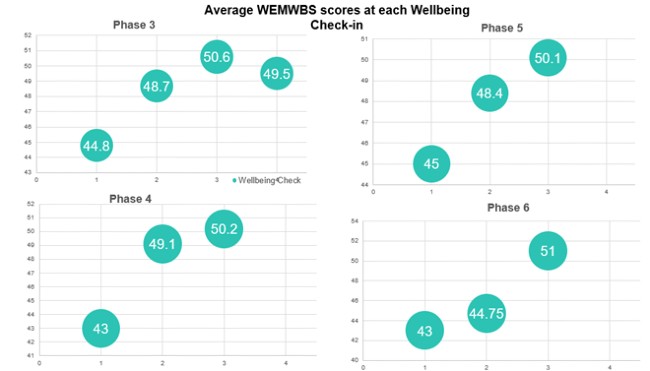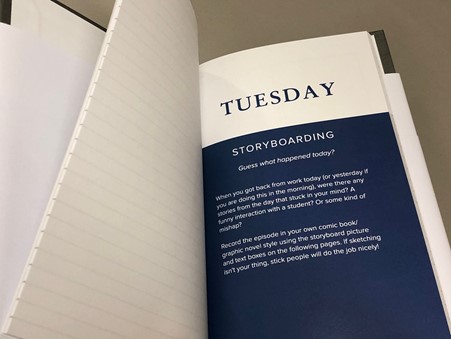Diary Toolkit should be rolled out in schools to support teacher wellbeing

The Department for Education (DfE) has recognised that provision for staff and pupil wellbeing must be enhanced and has committed extra funds to improving pupil and teacher wellbeing and providing expert mental health support. The Reimagining the Diary project (RtD) shows that a flexible, creative approach to diary-keeping, alongside engagement with a Continuing Professional Development (CPD) community, is an effective tool for improving teachers’ wellbeing, on both a personal and professional level. This leads to educators who are equipped with healthy wellbeing practices, increasing their resilience and making them more likely to stay in the profession. Further positive outcomes are better communication and creative approaches to problem solving. This reflective diary-keeping experience has benefits for the entire school community through enhanced workplace relations and enriched teaching practice, leading to better outcomes for students.
About the research
Through the ‘Reimagining the Diary’ project, academics worked with creative partners Stand+Stare to produce a Diary Toolkit (DT). Following multiple trial phases with teacher participants, the DT has been adapted to offer a research-informed solution to wellbeing practice which is customisable to meet the needs of the individual. The DT is used by individuals in their own time, in combination with an ongoing CPD course and access to a wellbeing community, either through Twitter or within school. In the research phase, the online CPD community was run in collaboration with Martyn Reah, the founder of #teacher5aday on Twitter. In the most recent phase of the project, the DT has been further developed to exist in multiple different formats – as a physical book, as a PDF or as a set of bookmarks, with an accompanying website – this allows for a more tailored approach.
Figure 1 (above): The physical Diary Toolkit (DT) trialled in Phase 3
"I don’t think I would have been able to get through this without this Toolkit"
Policy implications
-
In order to improve retention and boost recruitment, government and schools should embed teacher wellbeing at the national and school level in a sustainable way that ensures these programmes continue on a long term basis.
-
Teachers should be supported to look after their own wellbeing through continued use of the Diary Toolkit and encouraged to engage in the online wellbeing community, with designated timeslots within their directed time allocation for CPD.
-
The Department for Education should invest resources into the development of the Diary Toolkit programme to enable rollout at a national level through a whole-school approach.
-
School staff should be provided with the necessary materials to engage in the programme, including the physical book, access to printing where necessary and access to online sessions.
What makes the Diary Toolkit unique?
-
3 stages of use: Transition, Activity, Reflection
-
Carefully selected activities to promote reflection and improve wellbeing
-
Underpinned by multi-disciplinary academic research
-
Affordable, tailored, scalable
-
Portable and aesthetically beautiful
-
Playful, creative and multimodal space
- Mix of physical and digital resources
Background and context
The teaching profession is suffering from multiple crises. Teacher recruitment is unstable in the UK and the five-year retention rate is in decline (DfE), creating a crisis in our education system.
Not only do we have a retention and recruitment crisis, but we also have a wellbeing crisis in teaching, as recognised by the DfE in their Wellbeing for Education Recovery programme. Job-related stress has been shown to be higher among teachers than other professionals (NFER). The 2020 Teacher Wellbeing Index reported that 63% of education staff have considered leaving the sector due to workload, with 53% citing personal mental health and wellbeing as a factor. The Covid-19 pandemic has created additional challenges for education workers over the past year (Covid-19 and the classroom report). 52% of all teachers (50% of all education professionals) felt their mental health and wellbeing had declined either considerably or a little. The pandemic also affected the relationship between the education profession and the government - only 15% of all education professionals felt greatly or somewhat appreciated by the UK government during the Covid-19 crisis.
Improving provision for staff wellbeing is crucial both in retaining teachers in the workforce and also because “staff wellbeing is key to school success”.
Some comments on the appearance from the male-only group:
-
It felt important. Like it was meant to be used.
-
Looks professional - something you would want to use.
-
It was a well bound, simply presented diary that felt nice to hold
-
Well laid out and a good size
“promoting teacher wellbeing is a valid and appropriate activity for the profession as it enhances the capacity of schools to meet the needs of diverse populations.” (Roffey, 2012)
Key findings
This report focuses on key findings from Phases 3-6 of the Reimagining the Diary project. Details of each phase are shown in the table below. The project was launched on Zoom and monthly CPD sessions took place online. Participants were encouraged to use the DT every day and completed a final survey about their experience at the end of the phase.
| Phase | No. of participants | Time period | Funder | Demographic Details |
| 3 | 39 | 3 months | Unfunded collab, with Teacher 5 A Day |
87% female |
| 4 | 59 | 3 months | BUPA |
95% female |
| 5 | 44 | One school term | Impact |
86% female |
| 6 | 39 | One school term | BUPA |
100% male |
In addition to the final surveys, participants completed wellbeing check-ins at various stages, with the first check-in occurring before the initiation of the project to give a baseline wellbeing score. The Warwick-Edinburgh Mental Wellbeing Scale (WEMWBS) was used to calculate wellbeing scores. For context, previous WEMWBS scores from national surveys have varied from 49.85 in England in 2016 (NHS Digital, 2017), to 51.4 in Wales in 2018-19 (Welsh Government, 2019) and 49.4 in Scotland in 2018 (Scottish Government, 2020). Scores range from 14-70, with 41-44 signifying possible depression and scores of 45-59 represent average mental wellbeing (Warwick Medical School).
In this study, checks occurred at various stages; Check 1 occurred before the initiation of the project (see Figure 3). The average score on the wellbeing checks began at a very low 44.8 on the WEMWBS. It can be seen from Figure 3 that the wellbeing scores rose to a mean score of 49.6 after the initiation of the project.
- 97% of participants said they would advise other teachers to use the DT.
- 79.5% said using the DT improved their wellbeing during the COVID-19 crisis.
- 90% say being part of this wellbeing community had a positive impact on their wellbeing, personally and professionally.

Figure 3 shows the average wellbeing score at each check-in for phases 3-6. It can be seen that in each phase, wellbeing scores increased significantly after the initiation of the project (i.e. from check-in 2). There is an average increase of 6.5 across the four phases. This demonstrates a significant improvement. It must be taken into account that data is only gathered by participants who chose to respond and the response rate varied across phases and check-ins. The qualitative data collected in the final survey provide more context for the improvement in wellbeing and will be explored in the rest of this report.
“I struggled with ever putting myself at the top of any list. I realised my health, happiness and sense of self had been eroded.”
“Consistently journaling has helped me focus on the positives.”
“It helps to put things in perspective, and getting something ‘out’ in the diary - especially an annoyance or worry - often stops it from being a problem”
“As a scientist, I tend to write for specific purpose and intention. Also it tends to be succinct and to the point. I was surprised how liberating free-writing was!”
Catharsis, Celebration and Perspective
The DT serves many purposes which can improve overall wellbeing. It allows practitioners to both resolve and let go of tensions from the day. There is also space for celebration - to dwell on positive moments – which can encourage educators to consider what they love about the job. Furthermore, carving out time to engage in this process allows individuals to rebuild boundaries between work and home and take back control in a profession that has no parameters, which is particularly important in the recovery from the COVID-19 crisis when the distinction between home and work became non-existent.
Ideas which emerged from the data were around getting a new perspective, letting go, looking at the positives and moving forwards. These positive outcomes are shown in the quotes.
How can this improve teacher retention?
By allowing space to reflect, the DT can help education staff rediscover the joys of the profession. Furthermore, the development of a personalised wellbeing routine equips teachers with coping mechanisms to support them through the most challenging times in the job.
What are the benefits for the wider school community?
Improved wellbeing does not only benefit the individual. Staff who are encouraged to process and reflect become better communicators. Multiple responses cited ‘relationships/interactions with others’ as one of the many areas that the reflective practice helped with; two thirds of those comments mentioned ‘colleagues’ directly while the others referred to ‘others’ more generally. This shows how reflective practice benefits the wider school community through improved relationships. Furthermore, teacher wellbeing and student wellbeing can be thought of as two sides to the same coin; improved teacher wellbeing will also benefit students.
Summary of Key Conclusions
Improved individual wellbeing increases job satisfaction and builds resilience, which in turn leads to increased retention.
1. Teaching practice improves through reflective diary-keeping, which leads to better outcomes for students.
2. Improved individual wellbeing of teachers benefits the wider school community through better communication and relationships, leading to improvements in student wellbeing.
This government stated in its 2020 Wellbeing for Education Return programme that it “remains committed to longer term plans to improve mental health support”. If this is the case, the £8 million invested in mental health training must be followed up with investment in ongoing programmes such as this Diary Toolkit to ensure that practices become built-in and that investment is not short-term or tokenistic, but ongoing and holistic.
“It helped to pin down where things went wrong with some classes/lessons, and come up with strategies moving forward”
“Any mechanism that encourages me to pause and think and perhaps plan and not just reflect is something that I would value greatly.”
Authors
Lauren Hennessy, Lucy Kelly, Catherine Kelly (University of Bristol)
Further information
Covid-19 and the classroom: Working in education during the coronavirus pandemic
The home of the ‘Reimagining the Diary’ project
“Reclaiming teacher wellbeing through reflective diary-writing”, Lucy Kelly, 2020
Pupil wellbeing -Teacher wellbeing: Two sides of the same coin?, Sue Roffey, 2012
Policy Report 70: March 2022
Diary Toolkit should be rolled out in schools to support teacher wellbeing (PDF, 548kB)
Hennessy et al Diary Toolkit Teacher Wellbeing updated May 23 (PDF, 448kB)



“By being able to process in a range of ways and allow me to reflect and release, meant I feel lighter and more effective in my processing moving forwards”
“I get hung up on the negative/paperwork/forward planning and lose sight of the joy of actually teaching children.”
“It has been an absolute life-saver in this pandemic. I do not think I would have been able to get through this without this Toolkit.”
